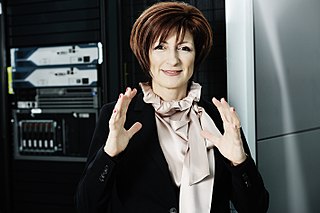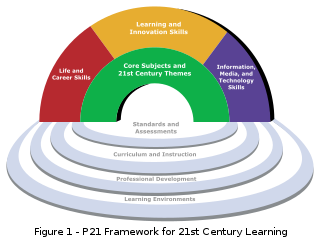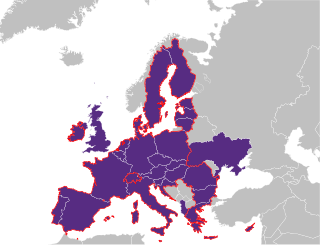Chief information officer (CIO), chief digital information officer (CDIO) or information technology (IT) director, is a job title commonly given to the most senior executive in an enterprise who works with information technology and computer systems, in order to support enterprise goals.
The digital divide is the unequal access to digital technology, including smartphones, tablets, laptops, and the internet. The digital divide creates a division and inequality around access to information and resources. In the Information Age in which information and communication technologies (ICTs) have eclipsed manufacturing technologies as the basis for world economies and social connectivity, people without access to the Internet and other ICTs are at a socio-economic disadvantage, for they are unable or less able to find and apply for jobs, shop and learn.

The Flemish Movement is an umbrella term which encompasses various political groups in the Belgian region of Flanders and, less commonly, in French Flanders. Ideologically, it encompasses groups which have sought to promote Flemish culture and the Dutch language as well as those seeking greater political autonomy for Flanders within Belgium. It also encompassed nationalists who seek the secession of Flanders from Belgium, either through outright independence or unification with the Netherlands.

Greater Netherlands is an irredentist concept which unites the Netherlands, Flanders, and sometimes Brussels. Additionally, a Greater Netherlands state may include the annexation of the French Westhoek, Suriname, formerly Dutch-speaking areas of Germany and France, or even the ethnically Dutch and/or Afrikaans-speaking parts of South Africa, though such variants are mostly limited to far-right groups. A related proposal is the Pan-Netherlands concept, which includes Wallonia and potentially also Luxembourg.

Digital literacy is an individual's ability to find, evaluate, and communicate information using typing or digital media platforms. It is a combination of both technical and cognitive abilities in using information and communication technologies to create, evaluate, and share information.
The digital economy is a portmanteau of digital computing and economy, and is an umbrella term that describes how traditional brick-and-mortar economic activities are being transformed by the Internet and World Wide Web technologies.
Internet in Belgium has a high level of adoption and engagement, with a 93% uptake rate among individuals as of 2022, higher than the EU average of 89%. The country is on par with the EU average regarding digital skills, with 54% of its population having at least basic digital competencies. Illustrated through initiatives like the BeCentral digital campus, Belgium has created programs to boost digital literacy, which has trained over 425,000 students since 2017 to narrow the digital skills gap.

Sasha Bezuhanova is a Bulgarian public figure – business leader, investor and philanthropist with 20-years executive business career in HP and a multi-dimensional track record of service to society.

Solar power in Belgium reached an installed capacity of 9.9 GW at the end of 2023, an increase of 1.8 GW from 2022.
The Digital Champions are appointed by each European Union Member State to help them and the European Commission promote the benefits of an inclusive digital society. The Digital Champions act locally. They work with citizens, communities, businesses, governments, and academia. They do so by helping individuals become digital, by promoting e-skills in education, fostering e-government services, encouraging entrepreneurship, supporting businesses to embrace new technologies and be more competitive, contributing to research and innovation. They also advise the European Commission on the implementation of the Digital Agenda for Europe. The European Commission regularly interact with the Digital Champions and this exchange provides a valuable platform to discuss, compare and expand action at grass-roots level. The Digital Champions meet at least twice a year.

Anusha Rahman Ahmad Khan is a Pakistani politician who served as Federal Minister for Information Technology and Telecommunication, in Abbasi cabinet from April 2018 to May 2018. Previously she served as the Minister of State for Information Technology and Telecommunication of Pakistan from June 2013 to July 2017 in the third Sharif ministry and again from August 2017 to April 2018 in the Abbasi ministry. She had been a member of the National Assembly of Pakistan from 2008 to May 2018 representing the Pakistan Muslim League (N). In the 2024 Pakistani Senate election, Anusha emerged victorious in the senate seats reserved for women.

21st century skills comprise skills, abilities, and learning dispositions identified as requirements for success in 21st century society and workplaces by educators, business leaders, academics, and governmental agencies. This is part of an international movement focusing on the skills required for students to prepare for workplace success in a rapidly changing, digital society. Many of these skills are associated with deeper learning, which is based on mastering skills such as analytic reasoning, complex problem solving, and teamwork, which differ from traditional academic skills as these are not content knowledge-based.

Thomas Buberl is a German businessman who has been the CEO of Axa since 2016.

The European DIGITAL SME Alliance is a community of small and medium ICT enterprises (SMEs). Its members are national sectorial digital SME associations in 30 countries and regions in the EU and neighboring countries, all together it associates more than 45,000 SMEs. DIGITAL SME was established in 2007 to represent the voice of ICT SMEs and their interests in the European institutions and other international organisations. DIGITAL SME is the first European association of the ICT sector exclusively. The current president is Oliver Grün.

Saskia Christina Esken is a German politician of the Social Democratic Party of Germany (SPD) who has been serving as co-leader of the party since being elected in December 2019 and re-elected in December 2021. She has been a member of the Bundestag since 2013 and was an IT specialist in the early 1990s.
Gender digital divide is defined as gender biases coded into technology products, technology sector, and digital skills education. It can refer to women's lack of access to, use of, and professional development in computing work. The gender digital divide has changed throughout history due to social roles, economics, and educational opportunities.
The Digital Economy and Society Index (DESI) monitors Europe's overall digital performance and tracks the progress of European Union (EU) countries regarding their digital competitiveness. On an annual basis, it monitors the performance of member states in digital connectivity, digital skills, online activity and digital public services in order to assess the state of digitalization of each member state as well as to identify areas requiring priority investment and action.
Kedist Deltour is a Belgian model and beauty pageant titleholder who was crowned Miss Belgium 2021. She represented her country at Miss World 2023 on March 9, 2024.

Volt Belgium is a political party in Belgium. It is part of the pan-European party Volt Europa.

Geertrui Mieke De Ketelaere is a Belgian civil engineer and promoter of ethical, reliable, and sustainable artificial intelligence (AI). In her public presentations and books, she focuses on a simple explanation of the concept of AI and indicates which steps are required for a correct and ethical way of adopting this technology. She is an adjunct professor at Vlerick Business School and part-time AI Director at IMEC, and was appointed a Digital Mind by the Belgian federal government.. In 2018, she was nominated as Belgium's ICT Woman of the Year.












